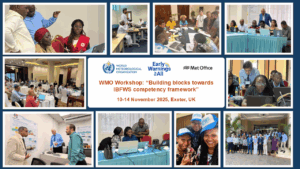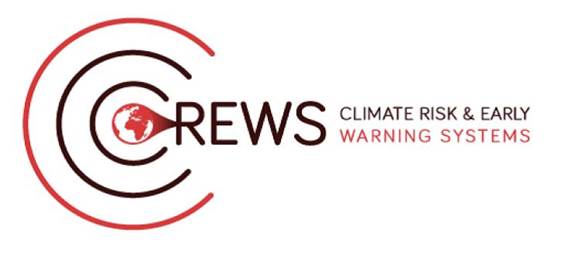
Exeter, UK – November 2025
In partnership with the World Meteorological Organization (WMO) and the UK Met Office, CREWS supported a global workshop in Exeter (10–14 November 2025) that laid the foundation for the Competency Framework on Impact-Based Forecast and Warning Services (IBFWS) — a key step towards achieving the Early Warnings for All (EW4All) initiative.
Held in alignment with the WMO Secretary-General Prof. Celeste Saulo’s Call to Action issued in Geneva on 20 October 2025, the workshop responded directly to the urgent need to scale up IBFWS and ensure comprehensive access to impact, exposure, and vulnerability data critical pillars for protecting lives and livelihoods from climate and weather extremes.
“By defining these competencies, we are creating a common language for early warning excellence—ensuring that forecasters, communicators, and decision-makers share the same foundation for saving lives and reducing risk,” said Vicente Vásquez Granda, Scientific Officer, WMO.
A Foundation for Capacity and Accountability
More than 30 experts from National Meteorological and Hydrological Services (NMHSs), regional training institutions, and international partners contributed to the co-development of core competencies, performance criteria, and training resources to guide countries in delivering people-centered, risk-informed early warnings.
The Competency Framework will be fully integrated into WMO’s global competency architecture and inform upcoming “train-the-trainer” programmes in 2026, supporting both national implementation and long-term sustainability.
This work is also in direct support of the newly approved International Technical Regulations on Early Warning Services (EWS-TR), which enter into force in 2027. These are the first global technical standards of their kind, ensuring quality, consistency, and accountability in the delivery of multi-hazard early warnings.
Sustaining a Global Movement
To further institutionalize IBFWS, the workshop established:
- A new Community of Practice on IBFWS, hosted by WMO
- A dedicated Service Desk for operational and technical support
- Plans to scale up online learning, including the WMO IBFWS e-course available here
These actions reflect a collective commitment to operationalizing the WMO Guidelines on Multi-Hazard Impact-Based Forecast and Warning Services (WMO-No. 1150 Parts I & II), which remain the foundational references for implementing IBFWS in practice.
CREWS’ Role: Enabling Transformation at Scale
As highlighted in the CREWS 2030 Strategy, strengthening human and institutional capacity is essential to ensure that no one is left behind in the face of climate hazards. This global framework equips countries with the tools to transform forecasts into timely, actionable early warnings—especially in Least Developed Countries (LDCs) and Small Island Developing States (SIDS) where risks are highest.
With support from CREWS, this workshop builds on over a decade of investment in early warning capacity and helps deliver on CREWS’ mission to scale life-saving systems and enable anticipatory action where it matters most.
Please contact ibfws@wmo.int for more inquiries.
